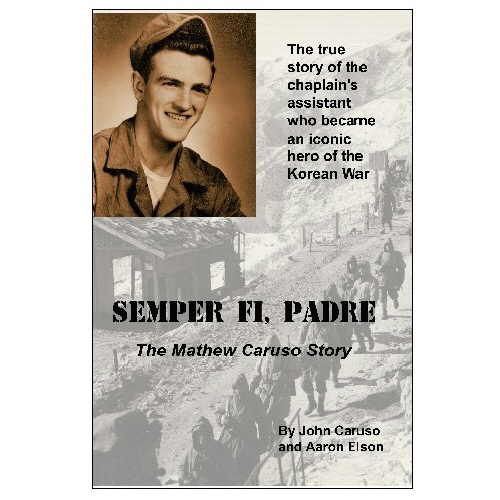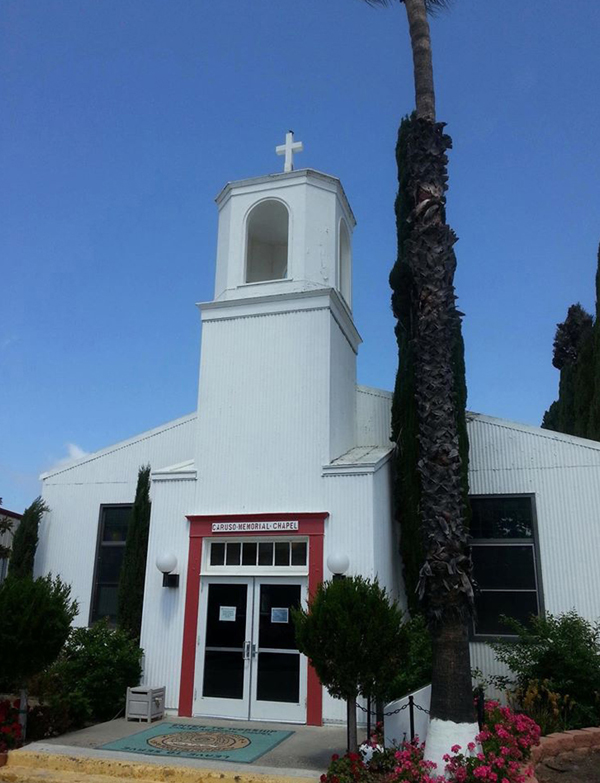
A Bugle Calling, Whistle Blowing Attack (excerpt)
The 7th Marine Regiment (Mathew’s unit) was the first American outfit to go head to head with the Chinese, on November 3, 1950, during what the regimental history called “a midnight bugle calling and whistle blowing frontal attack near Sudong.”
“The 7th Marines … spearheaded the thrust northward from Hamhung toward Chinhung-ni, about 35 miles distant,” the Chaplain Corps history says. “On the night of 2-3 November this advance force engaged a full Chinese Communist division. … Thus the 7th Marines had the distinction of being the first American unit to be engaged with a Chinese Communist force in large-scale combat. A furious five-day battle followed, during which the enemy’s casualties were estimated to have run as high as 9,000 with over 660 killed. The Marine casualties included 46 dead and 264 wounded.
“During the battle, two battalions of the 7th Marines were attacked from the front and on both flanks for about 24 hours. With these two battalions were Chaplains Griffin and Kester M. Hearn. Here Chaplain Griffin so distinguished himself that he was recommended for and later received the Silver Star.”

Stanley Modrak, an 85-year-old Marine veteran living in San Francisco, was severely wounded in the battle. He passed out from loss of blood after three machine gun bullets struck him in the side and forearm, and came to briefly … just as Father Griffin was giving him the last rites. He passed out again and came to in a field hospital.
Modrak, who would suffer from post traumatic stress disorder, described the incident in a memoir titled “Hostage of the Mind — a Korean War Marine’s Saga of War’s Trauma and the Battle That Followed Him Home.”
“As each November nears and northern California’s blue skies and wind-blown clouds flee, surrendering to a glowering, gray overcast, I recall a bleak fall of 1950 in North Korea,” Modrak wrote. “Disquiet memories intrude; discordant bugles blaring, echoing from hill to hill high above; sudden shock and fear as fingers of death clutch; a shadowy figure hovering.”
The 1st Marine Division was marching toward the Taebaek Plateau, which led to the Chosin Reservoir, Modrak wrote. “The ultimate goal was to traverse the desolate Taebaek Mountains, secure the Chosin Reservoir, then continue northwest over the mountainous spine of North Korea to eventually link up with the U.S. 8th Army driving up the western side of the Korean Peninsula. Col. Lewis ‘Chesty’ Puller’s 1st Marine Regiment along with Lt. Col. Ray Murray’s 5th Marines would follow. After a day-long trek climbing a narrow single-lane dirt road rising northwest, Col. [Homer] Litzenberg chose a small, rock-strewn valley just south of a North Korean hamlet called Sudong-ni to bivouac his regiment for the night.”
Sudong-ni means “town by the river,” Modrak said recently by phone from a hospital bed in California, where he was recovering from heart problems.
From his memoir: “During chow line with evening approaching fast, we heard scuttlebutt rumors that Red Chinese troops had been contacted nearby by Republic of Korea units. Actually the ROK’s 26th Regiment that we were replacing had indeed run into Chinese soldiers, taking 16 prisoners. The Red Chinese were clad in quilted uniforms, mustard color on one side and winter white on the reverse side. They wore fur-lined caps with ear flaps and most had canvas shoes with crepe soles that our Marines called tennis shoes — we couldn’t understand the shoes in the North Korean winter.”
Colonel Litzenberg, Modrak wrote, once said “The only Marines I want in my outfit are Purple Heart Marines.”
“As the crisp, darkening night air found the 7th Marines breaking out sleeping bags and preparing to sleep,” his book continues, strains of ‘Goodnight Irene’ filtered through our bivouac area” via Armed Forces Radio Tokyo. “Meanwhile, unknown to the slumbering Marines, the Red Chinese 124th Infantry Division of General Sung’s 42nd Field Army poised its 186th and 187th Regiments to hit Marine hill positions in a classic military double envelopment.”
“A double envelopment is usually pretty damn deadly,” Modrak said during our phone conversation. To make matters worse, he added, General Sung told his Red Chinese troops, “Kill these Marines as you would kill snakes in your homes.”
Despite decades of PTSD, Modrak noted in his book with a sense of Marine pride that “those snakes delivered a powerful bite.”
At 11:30 p.m., Modrak was awakened by cries of “Here they come!”
“We scrambled from our sleeping bags arming ourselves with M1 carbines and .45s,” he wrote. “A blare of discordant bugles echoed eerily from hill to hill above. Soon shadowy forms rose from the murky darkness in the river bed to our left. As we let go with a fusillade of weaponry the forms faded into the deepening gloom. … I marveled at the guts of our battalion officers as they stood tall in the valley’s center, directing their Marines’ defenses even though parachute flares exploding overhead bathed the tiny valley in a ghostly yellowish aura.
“As mountain rivulets unleashed by a spring thaw form, multiply and then rush downhill following paths of least resistance, so too came the Red Chinese. Breaking past and veering around strong points, relentless bands of quilt-garbed Chinese infantry cascaded into, through and around Leatherneck hill positions intent on swarming into the valley floor battalion command posts.”
As the battle raged, Modrak and his radio team were positioned to cover the riverbed when a non-commissioned officer shouted “One of you, come with me!”
“Marine discipline kicked in,” he wrote, and he ran with the officer for 50 or 60 yards “that seemed like a hundred” as tracers lit up the night and the sound of gunfire was all around. “Miraculously” making it through the gauntlet of fire, Modrak “dove into the shadows behind a low stone wall.”
When the burst of three machine gun bullets struck, “slamming into my side and forearm,” he wrote, “sound, feeling, disbelief all jumbled together in a disjointed sensation as I realized I was hit.”
He tried to shout “Corpsman!” but could only produce a murmur. “Marines nearby took up the call as I slumped to the rocky earth. With consciousness rapidly fading, Colonel Litzenberg’s words, ‘Only Marines … my outfit … Purple Heart,’ were my last thoughts.
“Reviving sometime later in the still smothering darkness, I sensed a shadowy form hovering over me. Was it an enemy, a fellow Marine, or…? Quiet, firmly enunciated words broke the chill night air: ‘In nomine, Patris, et Filii, et Spiritus, Sancti, amen.’ I then realized that the form must be our regimental chaplain, Father ‘Connie’ Griffin, pronouncing the Last Rites of the Catholic Church. Growing up through twelve years of Catholic schooling I knew full well their dire implications. ‘Am I dying, Father?’ I murmured. Passing out once again, I never heard any response. Awakening the next morning to daylight in a medical tent with other litter-bound wounded, it sure felt reassuring to be still among the living — also, there was no significant pain in my side that took two of the three rounds. Relief was short-lived, however. Crack! Crack! Dirt began kicking up in the tent’s dirt floor only a few feet from my litter! What a helpless feeling that was not knowing where the next shot would hit. ‘Sniper!’ yelled a corpsman. They began putting helmets on the litter-bound wounded to hopefully provide some sort of protection as the intermittent firing continued. Being half out of it, I don’t know if the Chaplain was in our med tent while the sniping was going on. Foolishly, our Navy surgeon opened the tent’s flap to look outside. Crack! ‘Ugh’ He bent over in pain as a slug tore into his thigh. Soon the fire ceased as we learned that Fox Company was busy clearing the snipers from a nearby hill.”
By the end of the battle at Sudong-ni, Modrak wrote, “General Sung’s 124th Infantry Division was rendered ineffective and withdrawn from action for the war’s balance. With another heroic victorious chapter added to the Marine Corps’ illustrious history, Colonel Litzenberg’s 7th Marine regiment began to resupply and prepare to resume their drive to the Chosin Reservoir.”
Although his name is not in any of the accounts at this point, Mathew never was far from Father Griffin at Sudong-ni.
Joseph Quick, a veteran of Okinawa in World War II and the 7th Regiment at the Chosin Reservoir, also described an encounter with Father Griffin in a 2010 interview with Don Moore for the Veterans History Project.
“I was hit in the butt, back and legs by shrapnel from an enemy mortar,” said Quick, of Port Charlotte, Fla. “The only thing I remember is leaving the ground when the incoming round hit.
“When I woke up I was in a blacked-out tent in a rear area with the dead, the dying and the wounded. I couldn’t see anything, but I could hear a Catholic chaplain giving a Marine his last rites.
“A few minutes later the chaplain crawled over to me.
“‘Father, I’m not a Catholic, I’m a Baptist,’ I told him.
“‘Son, do you believe in God?’ he asked.
“‘Yes sir,’ I said.
“‘Let’s say a prayer together,’ the priest suggested.
“I lay there praying in the dark with the chaplain.
“After he left, I said an extra little prayer of my own. I told God, ‘If you’ll get me out of here alive, I’ll never use your name in vain again.’ To this day, 54 years later, I haven’t. That’s pretty damn good considering how salty a Marine’s language can be.”
“For conspicuous gallantry and intrepidity as Chaplain for the Second Battalion, Seventh Marines, First Marine Division,” Griffin’s Silver Star citation begins, “in action against enemy aggressor forces in Korea from 2 to 8 November 1950. During the height of a fierce, coordinated night attack conducted by the enemy against elements of the Seventh Marines, Chaplain Griffin repeatedly exposed himself to heavy hostile fire as he moved among the troops giving encouragement. Later, when the same units of his battalion were subjected to heavy small arms fire, he left the comparative security of the sick bay and moved back to the front lines where he again braved hostile fire to render aid and comfort to the men wounded in the attack.”